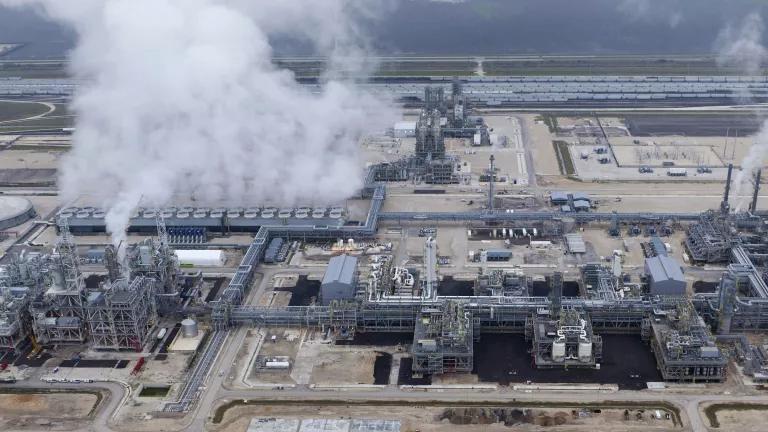Coalition calls on President Obama to follow the science and reject more giveaways to old, dirty corn ethanol
Today, a broad coalition of environmental organizations, including NRDC, sent a letter to President Obama expressing strong opposition to the policy proposals recently released by the corn ethanol lobby groups Growth Energy, the American Coalition for Ethanol, the Renewable Fuels Association and the National Corn Growers Association to expand the consumption of unsustainable biofuels. With the corn ethanol tax credit—known as the Volumetric Ethanol Excise Tax Credit or VEETC—set to expire at the end of the year, growing hesitancy on the part of lawmakers to extend more subsidies to the mature corn ethanol industry, telling admissions by industry insiders that the VEETC is unnecessary, and waning public support for ethanol, the proposal is a last-ditch attempt by the industry to shore up billions in taxpayer support for conventional corn ethanol.
As we noted here, just under the surface of the industry’s proposal is an important shift in position: an explicit acknowledgement that the VEETC in its current form should end and that taxpayer dollars should be spent encouraging better biofuels rather than just more biofuels, better or worse. The group has proposed a shift to a production tax credit, paid to ethanol producers instead of fuel blenders (as is the case with today’s VEETC) and based on reduced GHG emissions. Because the tax credit would go only to domestic producers, it would allow an end to protectionist import tariffs that keep foreign-made ethanol out of the U.S. market, regardless of its environmental performance.
Whatever the motivation, this is a step in the right direction. Unfortunately, the details of the industry’s proposal demonstrate that it intends to continue pushing for policies that would lock more old, dirty corn ethanol into the market. The worst parts of the industry “wish list” include an extension of corn ethanol subsidies, loan guarantees for ethanol pipelines, a redefining of “advanced biofuels” under the Renewable Fuels Standard (RFS) to include conventional corn ethanol, and a suspension of the EPA’s effort to account for emissions from market-driven deforestation—commonly referred to as indirect land use change (ILUC)—when assessing the lifecycle emissions of biofuels.
The coalition letter responds to these “asks” one by one, so let’s do the same here.
Should corn ethanol subsidies—in any form—be extended? For months we’ve discussed the massive cost and redundancy of the corn ethanol tax credit, which we pay to oil companies for each gallon of ethanol they blend into our gasoline despite the fact that since 2006, the RFS has required them to do so. Paying oil companies billions to obey the law would be fiscally irresponsible in the best of times, but in our current economic slump and with mounting deficit concerns, it is fiscally indefensible. But you don’t have to take our word for it. This summer, the Congressional Budget Office agreed, publishing a sobering study showing just how costly the VEETC is for U.S. taxpayers, which we discussed here.
But besides the cost, does the VEETC actually drive domestic corn ethanol production? Would its expiration spell the demise of the domestic corn ethanol industry as the industry claims? A growing stack of studies concludes that the answer to this is a resounding no. The University of Missouri and Iowa State University have both published studies in the last year estimating the additional gallons of ethanol production that we’d see if the VEETC was extended. We’ve blogged in more detail on their findings here, here and here but the basic conclusion is: removing the VEETC would have little impact on the domestic market for ethanol, since RFS mandates are the primary driver of domestic ethanol production.
Should we also fund the expansion of infrastructure that supports corn ethanol? Earlier in the summer, Growth Energy released its Fueling Freedom Plan, which called for ending the corn ethanol tax credit and shifting support to infrastructure investment. After reported squabbling amongst ethanol industry groups, it seems that the ethanol lobby now wants both! Investing in pipelines designed to accommodate corn ethanol is a huge waste of taxpayer money, locking us into ethanol when the advanced biofuels industry is quickly shifting gears and investing in biofuels that can drop right into our current fueling system.
Should the administration accept a redefinition of “advanced biofuels” in the RFS to include corn ethanol? On this, our response is clear: corn ethanol is a mature, mainstream industry that now provides about 10% of our light duty vehicle fuel supply and has been in commercial production for more than 30 years—not an advanced biofuel. Besides competing with our food supply, EPA has found that when all direct and indirect costs are added, corn ethanol creates more GHG emissions than the gasoline it is meant to replace. Making conventional corn ethanol eligible as an advanced biofuel would completely undermine the purpose of the RFS advanced biofuels mandate—namely, the development of cleaner, more efficient next generation biofuels. Furthermore, opening the floodgates to more corn ethanol and pulling the legs out from under the advanced biofuels industry would almost certainly kill any investments in real advanced biofuels.
Can we afford to not follow the science on terrestrial carbon accounting? Our letter expresses our categorical opposition to undermine EPA’s efforts to accurately account for the lifecycle greenhouse gas emissions of biofuels, including ILUC. The science is clear: ILUC emissions are the largest component of total emissions from conventional biofuels and can sharply reduce or negate any climate benefits we hope to see from using biofuels. Ignoring these emissions would result in promoting biofuels that are responsible for a net increase in global warming and hamper our overall ability to make good energy policy.
What are ILUC emissions and why is this such a serious concern? Carbon emissions from land use change result when carbon-storing forests are cut down and converted to farmland, either to grow dedicated energy crops or to meet unmet global demand for food when land elsewhere is diverted to grow crops for fuel, as in the case of U.S. corn grown for ethanol. The result? Instead of reducing emissions, we simply shift our emissions from fossil fuels to our agricultural and forest lands, risking our ability to address our climate challenges in time to prevent the worst impacts of climate change. [To better understand this dynamic, I recommend watching this great video by my colleague Nathanael Greene].
Our bottom line: any attempt to undercut the science by preventing EPA from accounting for ILUC emissions when assessing the lifecycle impacts of biofuels would raise serious concerns about the RFS and, importantly, erode environmental community support for all biofuels.
The transition away from old corn ethanol to the advanced biofuels we need will require smart policies and the right incentives. That is why we cannot continue to prop up a decades-old corn ethanol industry with more subsidies and infrastructure investments that lock this outdated, dirty fuel into the marketplace, allow the definition of “advanced biofuels” to be gutted, or EPA’s efforts to follow the science on ILUC to be undermined. What we need are investments in the development of the next generation of newer, cleaner, more competitive and advanced biofuels. Here at NRDC, we’ve proposed a Greener Biofuels Tax Credit, a technology-neutral incentive that would pay for real environmental performance, and a Billion Gallon Challenge, which would focus support on developing 1 billion gallons of truly low-carbon biofuels by 2014, produced using feedstocks and conversion technologies that promise scalability and broad sustainability. As the Obama administration considers energy policy, our letter expresses our hope that it rejects the corn ethanol industry’s cynical attempts to keep us locked into the biofuels of the past and instead embraces policies that will speed the transition to the biofuels of the future—biofuels that will deliver more green jobs, more energy and food security, and a cleaner environment.



